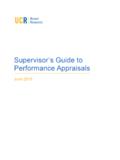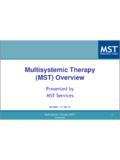Transcription of UCR Core Competency Model Behavioral Indicators
1 Rev. 03/20/2013 UCR Core Competency Model Behavioral Indicators Rev. 03/20/2013 p. 2 COMMUNICATION Descriptor Shares and receives information using clear oral, written, and interpersonal communication skills. Individual Behavioral indicator Behavioral indicator -Operational Level Behavioral indicator -Mastery Level Builds and maintains effective working relationships with customers and colleagues. Leverages working relationships with customers and colleagues to build strong connections, cooperation, and collaboration. Receives information to seek and understand differing perspectives. Actively seeks perspectives from others to ensure inclusiveness and understanding. Uses interpersonal skills to build cooperative relationships. Models interpersonal communication that invites participation and future dialogue. Receives and learns from feedback. Encourages feedback and uses it as a factor when considering personal and or organizational changes. Tailors and presents information to diverse audience using a variety of communication delivery methods ( , written, electronic, oral, interpersonal).
2 Tailors and delivers high-level presentations to diverse audiences using a variety of communication delivery methods ( , written, electronic, oral, interpersonal). Creates clear and concise written communication. Creates impactful written communication; improves others writing through editing and feedback process. Uses negotiation and mediation skills. Facilitates management of differences by addressing them openly and encouraging mutually beneficial resolutions. Clarifies project/task and goals as necessary. Uses effective communication techniques such as active listening and feedback to clarify project/task and goals. Keeps others informed in a timely manner. Communicates information effectively with other members of the organization to ensure effective progress of project plans. Remains respectful when in conflict with others. Uses appropriate conflict resolution techniques when necessary. Is polite. Demonstrates emotional control and professionalism when interacting with others.
3 Rev. 03/20/2013 p. 3 DIVERSITY AND INCLUSION Descriptor Models and promotes the University of California Riverside Principles of the Community and complies with UC policies on Diversity and Non Discrimination. Individual Behavior indicator Behavioral indicator -Operational Level Behavioral indicator -Mastery Level Promotes and sustains a community that acknowledges and celebrates differences. Advocates for the UC Riverside Principles of Community in all interactions. Creates opportunities for inclusion in a variety of settings. Designs and advocates for inclusive practices in all settings. Shows respect for people and their differences. Advocates for deep understanding and respect for the diversity of cultures, values, perspectives, and beliefs. Works to understand the perspectives of others and demonstrates empathy. Works to understand the perspectives of others and encourages them to provide their perspectives. Works to build mutual respect, fairness, and equity.
4 Models and promotes mutual respect, fairness, and equity to foster a sense of belonging. Understands and values individual differences. Advocates for understanding the values and benefits of diversity. Proactively addresses bias, prejudice, or discrimination Proactively addresses bias, prejudice, or discrimination and promotes an environment that celebrates and values individual differences. Creates a comfortable work environment that is free of harassment. Creates a comfortable work environment that is free of harassment and provide opportunities to report harassment. Demonstrates respect and empathy for others. Is aware of own biases, style preferences, and cultural lenses. Is flexible to accept others opinions. Solicits ideas and learns from others whose experiences and opinions are different from their own. Rev. 03/20/2013 p. 4 EMPLOYEE ENGAGEMENT Descriptor Demonstrates commitment to the job, colleagues, and the University and its mission by acting in ways that further the accomplishment of its goals.
5 Individual Behavioral Indicators Behavioral Indicators -Operational Level Behavioral indicator -Mastery Level Meets commitments. Holds self and others accountable for meeting commitments. Completes tasks and assignments and seeks feedback. Invites input from others and shares ownership and recognition. Actively engages in activities for optimal performance. Creates and supports a climate to maximize performance. Accepts challenge and adjusts to change. Demonstrates enthusiasm for capturing new opportunities in the face of change or challenge. Understands the ethical values of UC-Integrity, Excellence, Accountability, and Respect. Understands and Aligns work with personal talents, passion and the ethical values of UC-Integrity, Excellence, Accountability, and Respect. Communicates with other organizational/team members. Communicates with other organizational/team members and provides feedback on how to improve future performance. Rev. 03/20/2013 p. 5 INNOVATION AND CHANGE MANAGEMENT Descriptor Uses personal knowledge and professional experience to envision the future, anticipate change, capitalize on opportunities and develop innovative options that further the strategic direction of the organization.
6 Individual Behavioral Indicators Behavioral indicator -Operational Level Behavioral indicator -Mastery Level Understand the big picture and vision of the organization. Champions the organization s vision. Aligns priorities with goals. Establishes priorities and ensures their alignment with goals. Seeks input from a variety of constituencies. Seeks input from a variety of constituencies and uses the feedback to redirect efforts as needed. Considers alternative solutions. Seeks, evaluates, and implements alternative solutions. Comprehends connections within complex issues. Encourages others to appreciate connections within complex issues. Implements change. Manages change. Organizes projects and associated time and priorities. Oversees project management and implements strategies. Recognizes the impact of decisions on organizational outcomes. Anticipates and seeks an understanding of the impact and implications of decisions on planned outcome or results.
7 Uses sound decisions to align outcome with organizational goals. Uses knowledge and experience to analyze issues and factors which influence or constrain organizational priorities, goals, and results. Resolves conflicts among goals and sets priorities. Resolves conflicting goals and priorities using formal organizational knowledge and informal network relationships to accomplish objectives. Ability to adapt and use alternative techniques to achieve organizational goals. Uses creative techniques and skills to design and develop options that improve how the organization operates. Rev. 03/20/2013 p. 6 JOB MASTERY AND CONTINUOUS LEARNING Descriptor Demonstrates responsibility for one s own career path and continuous learning by identifying and applying new skills as needed to perform successfully on the job. Individual Behavioral indicator Behavioral Indicators -Operational Level Behavioral Indicators -Mastery Levels Applies background, technical knowledge, education, and prior job experiences to current and new job situations.
8 Demonstrates technical competences, job knowledge and ability to add value beyond the core job function. Learns quickly. Continually strives to upgrade the depth and breadth of technical and professional skills. Makes time for appropriate training. Makes time for appropriate training, keeps current on tools, technology, and information needed to meet job performance and challenges. Shares knowledge with others to enhance performance. Shares knowledge and supports peers, staff, and others to increase skills, foster improvement and enhances outcomes. Utilizes feedback. Encourages feedback to enhance performance. Rev. 03/20/2013 p. 7 RESOURCE MANAGEMENT Descriptor Demonstrates integrity, accountability and efficient stewardship of university resources in a manner consistent with the UC Standards of Ethical conduct and other policies. Individual Behavioral indicator Behavioral Indicators -Operational Level Behavioral indicator -Mastery Level Exercises accountability in managing university resources.
9 Models accountability in managing university resources in an open, effective manner. Uses discretion and sound judgment. Models the use of discretion and sound judgment. Understands university values. Embraces university values and integrates them when managing any resources. Understands and applies university policies and procedures. Establishes and promotes university policies and procedures. Manages resources. Displays stewardship when allocating and managing resources. Manages budget. Oversees budget. Adheres to university safety guidelines. Models and promotes Behavioral safety in accordance with university safety guidelines. Manages risks. Raises awareness in others about managing risks. Rev. 03/20/2013 p. 8 RESULT ORIENTATION AND EXECUTION Descriptor Demonstrates the ability to analyze situations or problems, make timely and sound decisions, construct plans and achieve optimal results. Individual Behavioral indicator Behavioral Indicators -Operational Level Behavioral indicator -Mastery Level Sets and meets quality improvement targets.
10 Uses benchmarking and reviewing best practices to set and meet quality improvement targets. Strives for efficient, effective, high quality performance. Takes initiative and evaluates trends to improve efficiency and effectiveness resulting in high quality performance in self and in the organization. Delivers results by deadlines. Maintains a sense of urgency to complete high-priority actions and meets commitments. Responds to difficult situations and takes initiative to make improvements. Displays resiliency and takes proactive measures to make improvements. Focuses on quality. Ensures the delivery of high quality results. Develops solutions to overcome obstacles. Leverages personal and organizational resources to creatively develop solutions, overcome obstacles, resolve conflicts among goals to achieve high quality outcomes. Uses effective organizational skills to accomplish goals and objectives. Uses critical thinking to analyze issues systematically by planning, prioritizing, and organizing work while anticipating and adjusting to changes.



